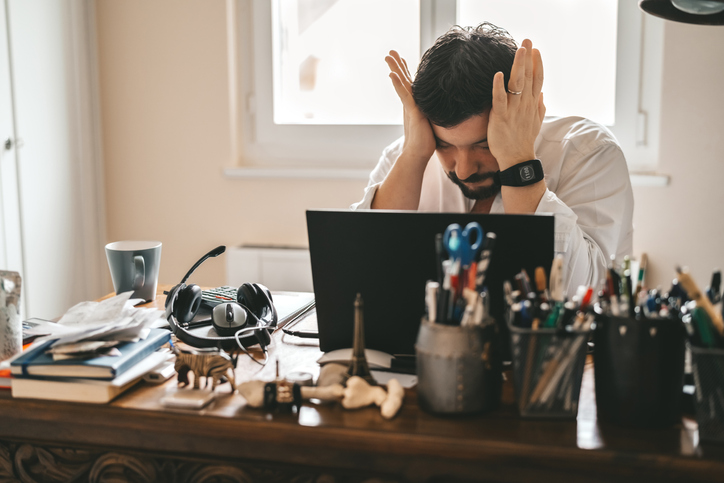According to a report from HSE, a whopping 828,000 people in the UK suffered from work-related stress, depression or anxiety in 2020. And with an overwhelming workload cited as the main cause of burnout by respondents, it’s clear that during lockdown, we’ve had more work than ever, not less.
That stress has had a direct impact on our work lives, too. In 2020, 17.9 million working days were lost to work-related stress, depression or anxiety. It’s a vicious cycle: the more days we lose to stress, the more our colleagues have to cover, increasing their workload.
But there is a way out of this predicament.
“The problem with working from home is that it becomes almost impossible for us to separate our work lives from our personal time,” says Andrew Cooke, Strategic Director at co-working and workspace provider Bruntwood Works.
“The key to escaping the stress that builds up during the day is being able to draw that line: by implementing some best practices to keep your workday from invading your downtime. That way, staff can prevent burnout and be more productive in the day to day.”
The good news is that breaking the cycle starts with some small changes in your daily habits. Bruntwood Works teamed up with experts at Push Doctor to find out how you can truly unwind from work when you’re stuck at home.
-
Create a separate workspace
One of the biggest challenges with working from home is trying to relax in the same space where you work.
“The first step is to try to create a clear separation between home and work,” says Dr Tom Micklewright, Associate Medical Director at Push Doctor. “If you have a room you can use exclusively for work, that’s perfect.
“If not though, you can still create the illusion of a separate space. Using a desk tidy, plants and even your favourite music to temporarily create a distinct ‘workspace’ can all help, especially if you clear them away at the end of the workday.”
-
Get out of the house
While staying at home is the reality for many of us at the moment, that doesn’t mean you can’t leave the house altogether.
“When we’re working from home, it’s easy to spend several hours sitting in one position, but remember to get up and move often,” says Dr Micklewright. Keeping your body active and breathing fresh air will keep you energised to help you through your day.
One of the best ways to ensure you do stay active is to bake it into your daily calendar. Dr Mickelwright recommends scheduling “multiple short work breaks throughout the day, including a lunchtime walk. The combination of exercise, sunlight and time away from your screen will help bring perspective and a boost to your mental health.”
-
Make plans in the evening
It sounds odd to suggest making plans in the middle of the pandemic. However, after-work plans have always been a lifesaver when it comes to preventing burnout.
While you may not be able to go to the pub with friends, you can arrange a video call at 6 pm. Alternatively, you could start an online group that regularly meets in the evening every week; perhaps a book club or a regular quiz.
Having plans means you have a reason to down tools. It also gives you something to look forward to throughout the day, adding some much-needed perspective to just how important that project you’re working on really is in the grand scheme of things.
-
Do a digital detox
Staring at our screens all day isn’t good for us. The constant overload of information can follow us even when we’re trying to relax on the sofa in the evening, be it ‘doom-scrolling’ through your newsfeed or the endless notifications that pull us back into our work inbox.
“Numerous studies have shown a correlation between social media use and mental health, with heavier users being more likely to feel depressed, stressed or anxious,” warns Dr Micklewright.
In the evenings, switch off work-related notifications on your phone. “Just setting times of the day, days of the week or places in the house where digital devices are not allowed can help restore some balance.”
-
Keep your body well-fuelled
The body is like a car: without the right fuel in the tank, it’ll soon run out of momentum and come to a screeching halt.
To avoid burnout, Dr Micklewright asserts that “it’s essential to look after your physical health. Eating nutritious, balanced meals and prioritising 7-8 hours of sleep every night will have a beneficial effect on your mind too.”
A sleep routine is about more than when you go to bed. It includes habitual prompts that tell your brain it’s time to switch off. For a lot of people, reading a book for the last hour of the day helps slow down their minds.
Be kind, unwind
One of the most important lessons that working from home has taught us is that unwinding from work doesn’t happen by default. Instead, we need habits and behaviours in place that untangle us from the messy web of emails and half-finished projects that otherwise keep us awake at night.
By being disciplined with these habits, workers can not only prevent burnout but also enjoy a productivity boost when they are in work-mode. You’ll quickly discover that you actually can balance work and life — and feel much happier for it.










